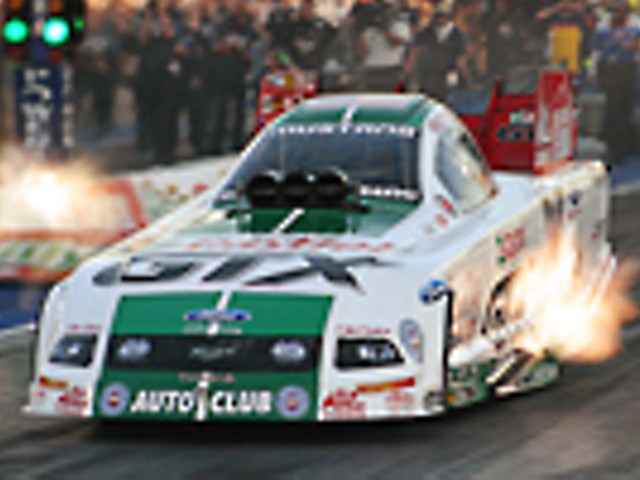As you enter the sanctuary at the Tower Grove Abbey, where Stray Dog Theatre is mounting its current adaptation of Franz Kafka's The Trial, there's a sense of being at the bottom of an aquarium. The light onstage is refracted, as if it's passing through water. Looking up, we see the remains of a door suspended from the ceiling, but it might as well be floating on the surface of a river or lake. Next to the useless door, a crumbling clock. Look closely and you will note that the Roman numerals on the clock face make no sense. Now allow your imagination to wander, and that large object at the rear of the stage might resemble an ancient rabbit-eared television set someone has discarded into the river. (Who would toss an old TV into an aquarium?)
What are we to make of all this detritus? Justin Been's scenic design (aided by his spooky sound design) reminds us that nothing is as it seems in the paranoid world of Kafka. Yet once the play begins, the action appears to be crystal clear. "You are under arrest," Joseph K. is informed by two interrogators. "I'm not guilty of anything," he protests. "What have I done? Who is accusing me?" For a disconcerting moment or three, you might think you're revisiting the Actors' Studio production earlier this month of Back of the Throat, Yussef El Guindi's stark depiction of government interrogators run amok in the wake of 9/11. In both stories, written 80 years apart, presumed innocents are charged with crimes that are never explained. "I'm confused," Joseph confesses. (Aren't we all?) "No one cares," he's told. (Did they ever?)
Will Ledbetter's Joseph K. travels the journey from naiveté and defensiveness to anger and outrage. At one point, when he stands up for himself and defiantly says, "I demand...," Joseph bears a striking similarity to Ebenezer Scrooge haranguing the Ghost of Christmas Future. (Like A Christmas Carol, this version of Kafka's shadowy story also takes place in the past, the present and the future.) But what struck me most about Ledbetter's arc is that late in the evening (as if in tribute to Kafka's "The Metamorphosis"), the actor somehow morphs into Anthony Perkins, who played the lead role in Orson Welles' film version of The Trial. It's not as if Ledbetter is striving for an impersonation, but suddenly Perkins is present, in all his trembling timidity.
Every once in a while, the adaptation by Kenneth Albers shows a flash of irreverent humor. But these moments, rather than setting the evening's tone, remain isolated. A script that surely was intended to be sharp and edgy instead becomes mired in verbal quicksand. When late in the evening we're told that it's been almost a year since Joseph K. was arrested, a viewer might be excused for asking himself, "Only a year? It feels like I've been sitting here much longer than that." There actually comes a point when said viewer has cause to fear that this play might never end. Joseph K.'s prolonged struggles seem destined to drag on and on until someone in the audience has the temerity to stand up and leave. (Franz Kafka through the prism of the Living Theatre.)
In a story where the perpetrators go unnamed, it's perhaps apt that we do not know who is responsible for these excesses. Is it adaptor Albers, whose script, rather like the Energizer Bunny, seems to keep on going and going? Or does the fault lie with director Gary F. Bell, who is responsible for the show's snail-like pace? I'm informed that a Kansas City staging of this same script ran two hours; here it crawls on for another 45 minutes. It may be that Kafkaphiles will eat this up with a spoon. Others might find The Trial all too aptly named.
Click here for a complete list of St. Louis stage capsules





